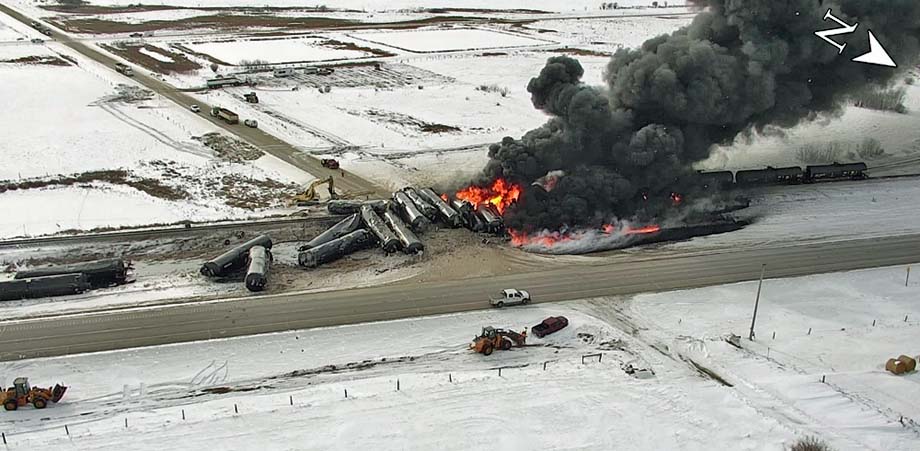
Guernsey Saskatchewan - Failure of a plug rail joint, installed about a week earlier, likely led to the derailment and fire involving a CPKC crude oil unit train near Guernsey, Saskatchewan, in February 2020, the Transportation Safety Board of Canada (TSB) determined in a final Investigation Report R20W0025 released Friday (7 Jun 2024).
 Due to URL churn, a link to Transportation Safety Board (TSB)
Investigation Reports is no longer provided, manually search for the Investigation Report number indicated
above.
Due to URL churn, a link to Transportation Safety Board (TSB)
Investigation Reports is no longer provided, manually search for the Investigation Report number indicated
above.
The 6 Feb 2020 incident, the second involving a CPKC train of crude near Guernsey in a two-month period, led to new
speed restrictions for hazardous-material trains in Canada.
Thirty-two cars derailed, spilling approximately 1.75 million liters (462,300 gallons) of crude oil, which ignited,
closing a highway and leading to the evacuation of about 85 people.
No one was injured.
The eastbound train of two head-end locomotives, 104 tank cars of crude oil, two buffer cars, and a rear distributed
power unit, was en route from Rosyth, Alberta, to Noyes, Minnesota, when it derailed while traveling at about 44 mph
at mile 43.63 on the Sutherland Subdivision at the Bloomfield Road grade crossing near Guernsey.
The 31st through 62nd cars derailed, with 30 of them breached, resulting in a major fire.
About 300 feet of track was destroyed extending east from the east switch of a wye for a spur to a nearby potash
mine.
The track where the incident occurred had been inspected regularly, including visual inspections daily on the eight
days prior to the derailment.
A 22 foot section of 115 pound plug rail had been installed on the track's north rail on 14 Jan 2020 to address a break
near the east switch of the wye for the potash spur.
However, on 29 Jan 2020, inspectors noticed that the plug rail had not received the required ultrasonic inspection, it
was replaced late in that evening in conditions that included temperatures of minus-5 degrees Celsius (23 degrees
Fahrenheit), with a wind chill of minus-10 Celsius.
The TSB found the replacement was done by a team that did not routinely replace rail and was working under demanding
conditions, "both of which likely contributed to the installation of a poorly supported rail
joint."
That likely played a part in the joint failure.
The TSB noted several similarities between the 6 Feb 2020 derailment and the 9 Dec 2019 incident just 5 miles to the
west.
It also notes that "substantial safety action" resulted from the two incidents.
The TSB issued two safety advisories, one regarding train speeds for trains carrying hazardous materials, and one on
track standards for hazardous-material routes.
Transport Canada responded with a series of new rules on train speeds and track.
And CPKC developed a system to detect rail breaks in non-signaled territory, increased its fleet of autonomous track
geometry cars, and undertook substantial trackwork on the Sutherland Subdivision in 2020.
David Lassen.
(likely no image with original article)
(usually because it's been seen before)
provisions in Section 29 of the
Canadian Copyright Modernization Act.
